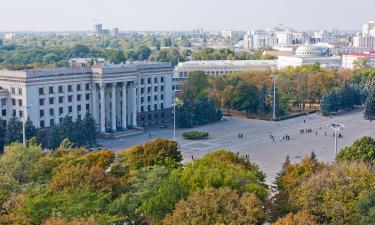Own hand is the master
Why budget control mechanisms are so weak in Russia
There's no law for the fools
(an observation)
Legends and myths about budget proficit
An old well-known truth that a budget plan in Russia is executed uneven and subjective, was once again proven in January-September 2003.
According to official Minfin (Russian Finance Ministry) report, federal budget profits were 7.6% above the plan (and amounted to 1893.6bln rubles). It seemed there appeared an opportunity to source additional finances to the country's essential needs, but the fact was that budget expenses (1771.5bln rubles according to the plan) were underfinanced by 4.3% (and by as much as 10.8% in September)
 This structural maneuver clearly demonstrates the real motivations of the Russian state and Minfin in the first place. Triumphing liberal fundamentalists (characterized by one of fund analysts as "liberal cannibals") aim at formal statistical parameters instead of true economic development. Once such a parameter was inflation, now it is budget proficit.
This structural maneuver clearly demonstrates the real motivations of the Russian state and Minfin in the first place. Triumphing liberal fundamentalists (characterized by one of fund analysts as "liberal cannibals") aim at formal statistical parameters instead of true economic development. Once such a parameter was inflation, now it is budget proficit.
Shrinking of expenses together with unplanned revenues lead to a fantastic level of the proficit by the end of nine months: 122.1bln rubles, or 1.3% of GDP. Even after the "power party" voted or 2004 budget with closed eyes in exchange for increase in budget expenses for 2003 by 68.9bln rubles, a yearly proficit is still 1.5 times above the planned level (110bln rubles)
Pariahs and favorites of Minfin
It is natural that overall under financing of budget expenses was unequally distributed between its parts.
Totally, by 100% were under financed expenses on courts, The Emergency Ministry, mass media, state reserves, mobilization preparations and the Space.
A little under financing (not above 3%) experienced ecology (financed 99.8% of the planned budget), law enforcement, state security, regional support, roads (99.3% each), transport and telecommunications (99.2%), defense (98.9%) and social politics (98.2%).
A significant under financing (under 10%) was observed in expenses on arms utilization (96.8%), farming (95.3%) and market infrastructure (94.5%). The latter two are Minfin’s eternal pariahs.
The worst financed were Ministry of Atom Energy (88.1%), military reforms (85.3%) and market infrastructure (80.2%)
It is remarkable that at the same time a number of areas in budget was financed above the plan. This unprecedented case in the history of Russian budget is a more serious breach of law than even under financing. But all is possible before the elections, and this "silent" financing of politically important spheres is the same winning technology as president’s speech at the "party of the power" congress during a period of agitation prohibition. In January-September 2003, expenses on science were 3.0% above the projected, on education – 2.7%, culture – 0.6% and health was 0.2% better financed.
It is clear that Minfin could give additional money to those areas only shrinking expenses on others – under the given conditions of gross budget under financing.
The most painful this hectic change of funds streaming is for the state-regions budget interrelationships, where under the fleur of democratic procedures and scientific knowledge, the state fully dictates its will to the regions. The most serious of this complete unaccountability was the federal power's decision to raise budget workers' incomes in the beginning of 2002. Regions had to finance this from their own pocket, and hence many had to stream money out from winter preparation, what lead to the true catastrophe of winter 2002/2003, when there were 2.1mln victims of energy and warmth switch-offs (instead of the usual 116,000).
Minfin's dead money
Ineffective use of budget money is clearly demonstrated by the fact of existence of gigantic unused remains on the accounts of federal budget. Those remains are significantly above the official "finance reserve". The sums which are held are so big that the problem was recognized by Minfin itself. However, Minfin's actions and tight government control lead only to a little result: in the beginning of 2003 there remained 280.4bln rubles unused in the budget accounts!
Their subsequent changes were very uneven. In the first quarter the remains grew by 20.7bln, fell by 43.4bln in the second, grew 24.2bln in July, fell in August by 31.5bln and in September by further 4.0bln. Overall, in nine months they fell 34.0bln rubles – by 12%, and amounted to 246.4bln rubles.
This could have become a serious achievement, deserving a praise, but only if the money were spent to resolution of the country's real problems. This has not happened.
Formally freed, this money went to budget receivers. However, rules of use of such money are so complicated (and the receivers are often so badly prepared) that month after month they sit still in the receivers' accounts, and become "unused funds" there.
The dynamics of such funds at the receivers' accounts is also uneven. Growth in the first quarter was 79.8bln, further 24.4bln in the second. In July, decrease of 2.0bln, in August by 11.6bln, but in September they grew by 10.7bln rubles.
As a result, at the same time when unused funds shrink by 34bln in the federal budget, they grew by 113.1bln in budget receivers' accounts in January-September. This means that overall amount of dead money only in the federal budget system of Russia grew by 69.1bln rubles in January-September period.
Even if it is assumed that fight against inflation is more important than economic development, and that money which find no use have to be "sterilized" but not used, creating opportunities for investments (by various means: from liberal protection of property and anti-monopolistic state policies, to state warranties to the big investment projects), even under such assumptions Minfin chose too rough a policy. Sterilization of the monetary mass within a budget is as sane (but less effective) policy as using guillotine against headache.
A much more effective means would be streaming an excessive ruble liquidity to finance inner state loans, while excessive foreign currency liquidity should go to finance foreign debt. We underline: from the sane point of view, this policy has no validity, as monetary mass sterilization policy overall. But it lead to much less damage than Minfin's current actions.
The Accounts Chamber: "stranger in the town"
A reason behind the problem – an absence of independent control over budget execution. This is why Minfin is practically free in its budget policy.
Meanwhile, a special governmental organization has been in power to control the use of budget funds from 1995: The Accounts Chamber.
There were many hopes associated with it, but the reality did not live up to it. The Accounts Chamber is devoted to relatively small problems mostly, not touching upon truly important painful questions, or not having a real right of voice in their discussion.
In the course of the Chamber's work it became clear that its low real influence depends on deep institutional reasons rather than on its chiefs.
The foremost reason is the Chamber's dependency on Minfin, the main object of control. Minfin ratifies its annual spendings, and it is obvious that it is impossible to control the force which controls your own size, tempo and character of your expenses.
Another reason of the Acoounts Chamber inefficiency is unprofessional character of auditors appointment (sometimes clearly resembling corruption). Auditors appointed from Duma are appointed by the parties in fact, hence they serve their parties' interests instead of the state's. From the Federation Council they are appointed by the powerful governors (a classic example is Chukoka's ex-governor Nazarov appointed as an auditor by R. Abramovitch).
The practice of appointment of auditors by the parliament and their need to report straight to the parliament palates means a lack of tight governing within the Chamber itself: in practice, auditors are not controlled by the Chamber head.
These shortcomings can be corrected without any expenses, and this would radically change Accounts Chamber into a truly professional body. It is important, in particular, to ratify the Chamber's expenses within discussion of federal budget, which has to be presented in project by the chief of Accounts Chamber and not a finance minister.
Without a real working mechanism of the budget control, rights of Russian citizens will suffer, the budget system will remain inefficient, and tax paying will have no meaning (if not counter-productive, as it is in the budget for 2004, which plans to invest them into Russia’s strategic competitors development).
Mikhail Delyagin
Institute for the Problems of Globalization director, PhD Econ
Subscribe to Pravda.Ru Telegram channel, Facebook, RSS!



